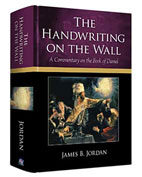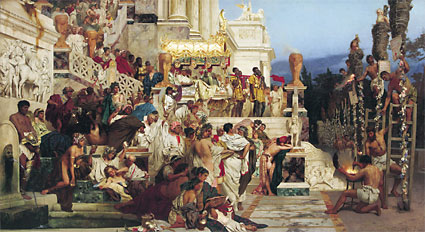Apr
10
2009
There is no other world to compare God’s world to. There is no “music” except God’s. It can be “played” well or perversely, but there are no other raw materials at hand. God’s personality is fully displayed in the world, but it is easy for us to become deaf to this fact.
The Bible tells us that this deafness and blindness is sin: “For though they knew God, they did not glorify Him as God, or give thanks; but they became futile in their speculations, and their foolish heart was darkened (Romans 1:21). This verse describes the origin of secular philosophy. The sinner does not want to see God’s personality displayed in His works, and so he comes up with alternative explanations of the universe. The “universe simply is.” In philosophy, this “is-ness” is called “Being.” Ultimately, all non-Christian philosophy assumes that the universe is uncreated and made of neutral “Being.” Such a universe is silent.
For the Christian, however, the universe is created by God, and constantly speaks of Him… All the world has been made with God’s stamp on it, revealing Him.
The universe and everything in it symbolises God. That is, the universe and everything in it points to God. This means that the Christian view of the world is and can only be fundamentally symbolic. The world does not exist for its own sake, but as a revelation of God.
James B. Jordan, Through New Eyes, p.22-23
Comments Off | tags: Creation, James Jordan, Philosophy, Typology | posted in Quotes
Apr
10
2009
No Bible commentary is the last word, but James Jordan’s seven-year effort gets the ball through the hoop on Daniel. Here’s an excerpt from David Field’s review:
The approach of the book is marked by
 1. Immersion in and informed reference to the rest of the Hebrew Scriptures. The use of Genesis, Exodus, Leviticus, Ezra-Nehemiah, Esther, Isaiah, Jeremiah, Ezekiel, and Zechariah is astonishing and enriching at every turn. Use of or comment upon other books along the way are unfailingly stimulating and this applies to NT books as well, not least to Revelation which is greatly illumined by this work on Daniel.
1. Immersion in and informed reference to the rest of the Hebrew Scriptures. The use of Genesis, Exodus, Leviticus, Ezra-Nehemiah, Esther, Isaiah, Jeremiah, Ezekiel, and Zechariah is astonishing and enriching at every turn. Use of or comment upon other books along the way are unfailingly stimulating and this applies to NT books as well, not least to Revelation which is greatly illumined by this work on Daniel.
2. Confident deployment of redemptive-historical paradigms which have themselves been recognized through close and repeated study of the whole Bible. In particular, theologico-spatial zones, old creation /new creation eras, and prophet /priest /king roles feature heavily and often have real power to unlock or clarify the subject in hand.
3. The closest of close structural analysis of the sort that comes from multiple readings. Chiasms and parallels and other patterning devices are attended to with great care and in such a way as positively informs the interpretation rather than being mere observations along the path.
4. Seriousness about chronology. This is one of the characteristics of Jordan’s work overall, since he sees emphasis on “ideas” at the expense of history as revealing and strengthening the gnosticism of much contemporary Christianity. The detailed chronological work lying behind his interpretation of Jeremiah and Ezekiel and his resolution of some of the Daniel “difficulties” is awesome.
5. Interpretative weight given to what still gets called “inter-testamental” history. Inter-testamental history is redemptive history and Jordan emphasizes that God speaks to and about that period in the patterns of Daniel 1-6 and in the prophecies of Daniel 1-7.
6. Attention to numerics: word-counts, significant numbers, and the meaning of numbers. There is work here to compare with Bauckham’s work on Revelation.
7. Typology. This is not a “typological” commentary as such because although half of Daniel is narrative, half of it is apocalyptic prophecy. But when you attend to redemptive-historical patterns and to literary structures and sequences and to the importance of history as Jordan does, then, in some sense, all your work will be typological. At the macro-historical this means that Daniel is one of God’s major interpretative words for the entire second phase of the first creation. The first creation has a former days and a latter days and then gives way to the new creation. Daniel tells us about the last centuries and decades of the latter days of the old world.
8. Cheerful (and sometimes curmudgeonly) unfashionableness. Early dating, traditional authorship, defense of biblical chronology, unashamed constant reference to Christ (how could it be otherwise?!), impatience with “unbelieving scholarship”, utter lack of interest in being respected and consistent resolve to be useful. This may be a difficult example for young scholars (like those in Daniel 1!) to follow but it is thoroughly refreshing.
9. Theological creativity at level “Genius”. I thought I knew Jordan’s work reasonably well but over and over and over again there are “aha!” moments. In my copy now there are almost more sentences and paragraphs marked than unmarked!”
“The Handwriting on the Wall” is available from www.americanvision.com
Also available as an e-book.
Comments Off | tags: Apocalyptic, Bible Chronology, Bible history, Book Review, Daniel, David Field, James Jordan, Typology | posted in Biblical Theology
Apr
9
2009

or ‘Riding on a donkey’
Why do theologians use the phrase “the Christ event”? Besides depersonalising Christ’s life, is it possibly a symptom of the chronic disease afflicting much of modern theology?
Continue reading
Comments Off | tags: Barth, Gnosticism, James Jordan | posted in Biblical Theology
Apr
8
2009
In Hebrew, vindication and redemption are one word. When Job was confident that his redeemer lived, he was looking forward to his vindication against his “comforters.”
Jesus’ words against the Temple hung over Jerusalem for a generation, and would be vindicated despite Herod’s obsessive glorification of his graven image. Its completion in AD64 was taken as proof that Jesus was indeed a false prophet.
Christ came in judgment as He promised and the Temple was destroyed. Vindication and redemption came in one event, and new worship would be born through the death of the old.
“The pagan view of law is that justice is a balancing of the scales. The biblical view of law is that justice is transformational.”1
The death and resurrection of Israel in Christ as the head would be measured out in the people of God as the body. God’s Word brings division that leads totransfiguration. His justice always has one eye on the future.
1 James B. Jordan, Preterism vs. Gnosticism [lecture]. Available from www.wordmp3.com
Comments Off | tags: James Jordan, Job, Justice, Temple, Vindication | posted in Biblical Theology, Ethics
Apr
8
2009
A sample of the new ESV Study Bible was recently made available.
I liked this observation in the notes:
“Jonah’s rescue from death provides an analogy for the resurrection of Christ… The repentance of the Ninevites anticipates the wide-scale repentance of Gentiles in the messianic era.”
But not this one: “Humor, as Jonah’s behavior is not only ignominious but also ridiculous.”
When the prophets (like Elijah, Elisha and Jonah) were sent to Gentiles, it was to provoke Israel to jealousy because they would not listen to these prophets. Jonah understood his ministry meant condemnation would come upon his own people:
James B. Jordan said,
“I don’t think Jonah was some loyal nationalistic prophet. Jonah was in there every day complaining, criticising, prophesying, and denouncing the kingdom of northern Israel. It won’t do to say that Jonah didn’t want to take the Gospel to another nation. No, Jonah has something more profound in mind. Jonah was thinking about Deuteronomy 32:21. He didn’t want to take the Gospel to the Gentiles, because to do so was to bring about a curse on the Israelites. ”1
Paul was a more faithful Jonah, understanding this curse but obeying it nonetheless (Romans 9:3; Acts 28:28)
The study Bible looks good though.
1 Lectures on Jonah, available from www.wordmp3.com
[Originally posted 21 August 08]
Comments Off | tags: ESV, James Jordan, Jonah, Paul, Resurrection | posted in Biblical Theology
Apr
8
2009
When were the gospels written?
Matthew is the first of the gospels; there can be little doubt of this. The notion that Mark was first because Mark is shorter is nonsensical. Matthew was one of the disciples and was a man of letters. Who better to take notes during Jesus’ lifetime?
Moreover, immediately after Pentecost there would have been a demand for a book containing the teaching and works of Jesus.
The Jews were a people of the book. Each time God did a great work, a new part of Scripture was written to tell about it. The 3000 converts on the day of Pentecost would have expected such a book, and we can be pretty sure that Matthew set right down to write it. Doubtless he spoke with the other disciples, and perhaps Matthew’s gospel is to some extent a joint work. It is perfectly reasonable to assume that within a month after Pentecost copies of Matthew’s gospel were in circulation.
from BIBLICAL Horizons, No. 94 and 95.
Toward a Chiastic Understanding of the Gospel According to Matthew, Parts 1 & 2
© 1997 Biblical Horizons | www.biblicalhorizons.com
2 comments | tags: Bible Chronology, Bible history, Gospels, James Jordan | posted in Biblical Theology
Apr
8
2009
An Examination of Both the Federal Vision and the New Perspective on Paul
http://www.biblelighthouse.com/covenants/within_the_bounds_of_orthodoxy.htm
by Joseph Minich – April, 2006
This essay is neither a defense nor a sustained critique of either the Federal Vision or the New Perspective on Paul. The exclusive aim of this presentation is to ask the question, “Can advocates of either of these positions be considered as within the bounds of Reformation orthodoxy?” That is, whether or not one agrees with one or the other of these movements, or whether or not one agrees with how they word certain things, can they nevertheless be interpreted in such a way as to be within the broad parameters of the Reformed faith?
Continue reading
3 comments | tags: James Jordan, Orthodoxy, Postmillennialism | posted in Biblical Theology
Apr
8
2009

James Jordan points out that when the Lord confused the languages of the Babel builders, the Hebrew term is ‘lip’, and it carries the connotation of scattering their religious profession.
Continue reading
Comments Off | tags: Babel, James Jordan, Power of the Gospel, Tongues | posted in Biblical Theology, Ethics
Apr
8
2009
“The failure to understand the Babelic context of Israel’s history results in a failure to understand the purpose of tongues in the New Testament, and a failure to understand the historical transition that took place between A.D. 30 and 70. God judged Babel because if the people were united, nothing would be withheld from them (Gen. 11). Jesus prays that His people would be united, so that nothing will be withheld from us (John 17). It was necessary for Jewish and Gentile believers to overcome the Old Covenant bipolarity and be united, before the Gospel could really go forth in full power. After A.D. 70, with Jew and Gentile united in one Church, nothing can be withheld from us, unless we choose by our sin to be disunited. After A.D. 70, there is no longer any God-instituted historical disunity in operation.”
- James B. Jordan, The future of Israel re-examined
http://www.bullartistry.com.au/lastdays.html (articles 13-15)
Comments Off | tags: Babel, James Jordan, Tongues | posted in Biblical Theology, The Last Days
Apr
8
2009

“…since we have so great a cloud of witnesses surrounding us…” (Hebrews 12:1)
NOTE: THIS POST HAS BEEN REMIXED AND INCLUDED IN GOD’S KITCHEN.
To defeat Satan is to expose his lies to the truth – to unmask him. We see lots of unmaskings in the Bible. Many of these use the saints as bait. The true natures of Pharaoh, of Job’s accusers, and of Haman and the enemies of God in Esther were all exposed when God’s people became weak. A corpse always brings out the dirty birds (Matthew 24:28), the ‘Edomite’ false brothers waiting to loot a razed Jerusalem.
Continue reading
1 comment | tags: James Jordan, Job, Nero, Pharaoh, Postmillennialism, Satan, Witness | posted in Biblical Theology





























